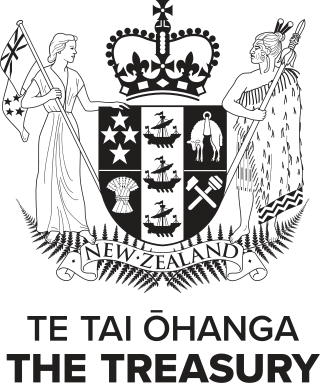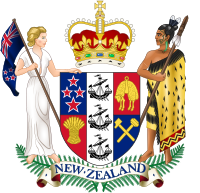
The chancellor of the exchequer, often abbreviated to chancellor, is a senior minister of the Crown within the Government of the United Kingdom, and the head of His Majesty’s Treasury. As one of the four Great Offices of State, the chancellor is a high-ranking member of the British Cabinet.
Rogernomics were the neoliberal economic reforms promoted by Roger Douglas, the Minister of Finance between 1984 and 1988 in the Fourth Labour Government of New Zealand. Rogernomics featured market-led restructuring and deregulation and the control of inflation through tight monetary policy, accompanied by a floating exchange-rate and reductions in the fiscal deficit.

Sir Simon William English is a New Zealand former politician who served as the 39th prime minister of New Zealand from 2016 to 2017 and leader of the National Party from 2001 to 2003 and 2016 to 2018. He had previously served as the 17th deputy prime minister of New Zealand and minister of finance from 2008 to 2016 under John Key and the Fifth National Government.

Sir Michael John Cullen was a New Zealand politician. He was a Member of the New Zealand House of Representatives from 1981 to 2009, the Deputy Leader of the New Zealand Labour Party from 1996 to 2008 and a senior minister in the Fifth Labour Government from 1999 to 2008, serving as Deputy Prime Minister, Minister of Finance, and Attorney-General.

Ruthanasia, a portmanteau of "Ruth" and "euthanasia", is the pejorative name given to the period of free-market policies conducted during the first term of the fourth National government in New Zealand, from 1990 to 1993. As the first period of reform from 1984 to 1990 was known as Rogernomics after the Labour Party Minister of Finance, Roger Douglas, so the second period became known as "Ruthanasia", after the National Party's Minister of Finance, Ruth Richardson.

The New Zealand Treasury is the central public service department of New Zealand charged with advising the Government on economic policy, assisting with improving the performance of New Zealand's economy, and managing financial resources. The Minister responsible for the Treasury is the Minister of Finance of New Zealand; however, from 1996 to 2002, there existed a more specific position of Treasurer of New Zealand. The role was created for Winston Peters by the Fourth National Government under Jim Bolger after the 1996 election, and abolished by Helen Clark’s government in 2002.

The New Zealand budget for fiscal year 2006–2007 was presented to the New Zealand House of Representatives by Finance Minister Dr Michael Cullen on 18 May 2006.

The New Zealand budget for fiscal year 2012–2013 was presented to the New Zealand House of Representatives by Finance Minister Bill English on 24 May 2012.

The New Zealand budget for fiscal year 2013/14 was presented to the New Zealand House of Representatives by Finance Minister Bill English on 16 May 2013. This was the fifth budget English has presented as Minister of Finance.

The New Zealand budget for fiscal year 2014/15 was presented to the New Zealand House of Representatives by Finance Minister Bill English on 15 May 2014. This was the sixth budget English has presented as Minister of Finance.

The New Zealand budget for fiscal year 2010-2011 was presented to the New Zealand House of Representatives by Finance Minister Bill English on 20 May 2010.

The New Zealand budget for fiscal year 2011-2012 was presented to the New Zealand House of Representatives by Finance Minister Bill English on 19 May 2011.

The New Zealand budget for fiscal year 2009-2010 was presented to the New Zealand House of Representatives by Finance Minister Bill English on 28 May 2009.

The New Zealand budget for fiscal year 2007-2008 was presented to the New Zealand House of Representatives by Finance Minister Dr Michael Cullen on 17 May 2007.

The New Zealand budget for fiscal year 2008-2009 was presented to the New Zealand House of Representatives by Finance Minister Dr Michael Cullen on 22 May 2008.
The New Zealand Budget is an annual statement by the New Zealand Government that outlines of the nation's revenues and expenditures for the preceding fiscal year and expectations for the next one. It is prepared by the New Zealand Treasury for the Minister of Finance. The Budget is usually presented to the House of Representatives in May.

The New Zealand budget for fiscal year 2016/17 was presented to the New Zealand House of Representatives by Finance Minister Bill English on 26 May 2016. It was the eighth budget English has presented as Minister of Finance, and the eighth budget of the Fifth National Government.

The New Zealand budget for fiscal year 2017/18 was presented to the New Zealand House of Representatives by Finance Minister Steven Joyce on 25 May 2017. It was the ninth budget of the Fifth National Government, and the first presented by Joyce in his role as Minister of Finance. This was the last budget presented by the Fifth National government which was defeated at the 2017 general election.

Budget 2019, dubbed the Wellbeing Budget, was the name given to the New Zealand budget for fiscal year 2019/20 presented to the New Zealand House of Representatives by Finance Minister Grant Robertson on 30 May 2019. This was the second budget presented by the Coalition Government. Its release was complicated by the accidental publication of budgetary documents on a test website two days prior to its official release on 30 May, attracting significant media and public attention.

Budget 2022, dubbed the Wellbeing Budget 2022, is the New Zealand budget for fiscal year 2022/23, presented to the House of Representatives by Finance Minister, Grant Robertson, on 19 May 2022 as the fifth budget presented by the Sixth Labour Government. This budget was released in the midst of socio-economic impacts of the widespread community transmission of the SARS-CoV-2 Omicron variant, rising living costs, and the 2022 Russian invasion of Ukraine.






